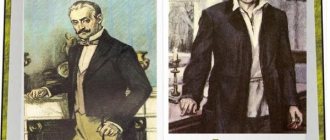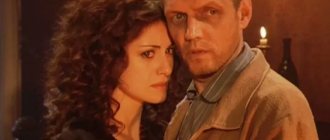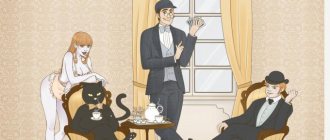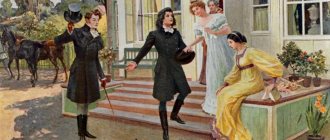Analysis of the episode “The Death of Bazarov” helps to see the inner world of the main character of the novel “Fathers and Sons” Ivan Sergeevich Turgenev. The author demonstrates the real Bazarov in the death scene. The main character bravely meets his death. Only now is he showing his true attitude towards his parents, towards Odintsova. Love for Odintsova shook his worldview, a strong position in life based on nihilism - the denial of generally accepted values such as love, kindness, faith. His death shows the failure of nihilistic beliefs.
The material was prepared jointly with a teacher of the highest category, Kuchmina Nadezhda Vladimirovna.
Experience as a teacher of Russian language and literature - 27 years.
Trial by Death
The author of the novel “Fathers and Sons” takes the central character through various trials throughout the novel, resulting in the debunking of Bazarov’s nihilistic theory. The very last and most important thing for understanding the true character of Evgeny Bazarov is the test of death.
The main character faces the approach of death with honor. Bazarov becomes infected when he tries to cure a sick man. His death is not accidental; he receives it in the hope of being needed by the people, to be needed by all of Russia.
The hero does not blame anyone but himself for the tragic fate. Bazarov does not want to die, but recognizes the power of death. Evgeniy understands that his time has come, but he fights to the end. The hero analyzes his own life and comes to the conclusion that his theory was wrong.
To see the real face of the main character of I. S. Turgenev’s novel “Fathers and Sons,” it is necessary to analyze in detail the scene of Bazarov’s death. This episode reveals all the best qualities of the hero, which were previously questioned and denied by Bazarov himself. Only when he is between life and death does the hero allow himself to be real. He renounces the beliefs that shackled his life. Bazarov, finding himself on the verge of death, met her courageously. The hero showed tremendous willpower. I. S. Turgenev shows what kind of evolution Bazarov went through. Only by expecting death does the hero understand the meaning of life.
Loneliness
This character is very different from other heroes: Kirsanov, Sitnikov, Kuvshina. The latter are his caricatured imitation. Bazarov leaves no one indifferent. It arouses interest, irritation, and curiosity. But his tragedy is that he is extremely lonely. Even in his parents' home, where he is loved and idolized, this hero does not find support. Love and understanding are the price he paid for his ideas. Bazarov realized his mistake in the face of death.
Analysis of the episode, which depicts the last days of his life, gives an idea of his inner strength and spiritual wealth. He is able to understand the inadequacy of his life. He realizes that science, which was the meaning of his existence, will not save him.
Attitude towards love
Realizing that he will soon die, Bazarov asks his father to call Odintsova in order to confess his feelings to her. He understands that now is exactly the case. Denying all manifestations of love, Bazarov understands that he was wrong all this time. The central character is only now saying everything that he has felt for a long time. After declaring his love, Evgeny says goodbye to Odintsova and wishes her a happy life. In parting, Bazarov asks Odintsova to kiss him - “to blow on the dying lamp.” The main character realized that he gave in to love too late.
What will we do with the received material:
If this material was useful to you, you can save it to your page on social networks:
| Tweet |
All topics in this section:
Raskolnikov and Svidrigailov Much has in common with Raskolnikov in the image of Svidrigailov. Dostoevsky, through various means, makes us feel the closeness of these spiritual counterparts and constantly draws parallels between them. Dissenter
Raskolnikov and Sonya Marmeladova Rodion Raskolnikov and Sonya Marmeladova are the two main characters of the novel, appearing as two oncoming streams. Their worldview forms the ideological part of the work. Sonya Marmeladova - moral idea
Raskolnikov and Luzhin Rodion Raskolnikov, the main character of the novel, is a young man, coming from an impoverished noble family, a university law student, forced due to lack of environment
Evgeny Bazarov and Pavel Petrovich Kirsanov The ability to sensitively guess the problems and contradictions that have arisen in Russian society is an important distinguishing feature of Turgenev the writer. Pavel Petrovich Kirsanov - the son of a military general, who took
Evgeny Bazarov and Arkady Kirsanov The great Russian writer I. S. Turgenev subtly felt everything that was happening in the public life of Russia. In the novel “Fathers and Sons” he touches on a topical issue for the sixties of the last century.
Father and son Kirsanov “Fathers and Sons” is one of the central works of I. S. Turgenev. He wrote this novel in an alarming and, perhaps, the most dramatic period of his life. It is generally accepted that the title of a novel contains
What Evgeny Bazarov claims and denies In the novel “Fathers and Sons,” Turgenev showed the main social conflict of the 60s of the 19th century - the conflict between liberal nobles and commoner democrats. So, in Turgenev’s novel “Fathers and
The novel Fathers and Sons and its time “Fathers and Sons” by Turgenev is a socio-psychological novel in which the main place is given to social conflicts. The action of the novel takes place in 1859. The novel “Fathers and Sons” was created
Ilya Ilyich Oblomov and Olga Ilyinskaya Ilya Ilyich Oblomov and Olga Ilyinskaya, the heroes of Goncharov’s novel “Oblomov,” understand the meaning of life, love, family happiness in different ways. Oblomov was born in Oblomovka - a “blessed” corner of the earth
Poems by F.I. Tyutchev about love F.I. Tyutchev entered the history of Russian poetry, first of all, as the author of philosophical lyrics, but he also wrote a number of remarkable works on the theme of love. Love and philosophical poems of the poet
Features of Tyutchev's poems The main features of the poet's lyrics are the identity of the phenomena of the external world and the states of the human soul, the universal spirituality of nature. This determined not only the philosophical content, but also the artistic
Lyrics by A.A Fet Mostly in Fet's lyrics there are poems about the beauty of nature, its perfection, about the fact that a person should strive for that inner harmony that is present in nature. The closest to me are
Features of the lyrics of Fet A.A. Fet is one of the outstanding Russian poets of the 19th century. He opened up to us an amazing world of beauty, harmony, perfection, Fet can be called a singer of nature. The approach of spring and autumn withering, soul
Features of Nekrasov's lyrics The poetic world of Nekrasov is surprisingly rich and varied. The talent that nature generously endowed him with and his extraordinary hard work helped the poet create such polyphonic and melodious lyrics.
The originality of the lyrical hero in Nekrasov’s poems For lyric poetry, the most subjective kind of literature, the main thing is the state of the person’s soul. These are feelings, experiences, reflections, moods expressed directly through the image of the lyrical hero, the highest
Nekrasov's poems about love Nikolai Alekseevich Nekrasov is almost never perceived as a poet who worked in the mainstream of love poetry. His original and familiar works are considered to be “Peasant Children”, “Women
To a lover How to tell about a difficult road, Once traversed by yourself, I listen to the reckless speech, To your rosy hopes. Love with crazy dreams And I...
The city of Kalinov and its inhabitants The writer’s imagination takes us to a small merchant town on the banks of the Volga, to admire the local beauty, and to take a walk along the boulevard. Residents have already taken a closer look at the beautiful nature in the surrounding area
Kabanikha and Wild A. N. Ostrovsky in the play “The Thunderstorm”, written by him in 1859, showed the life and customs of Russian provincial society of that time. He exposed the moral problems and shortcomings of this society that we and
Katerina among the inhabitants of the city of A.N. Ostrovsky in his play “The Thunderstorm” divided people into two categories. One category is the oppressors, representatives of the “dark kingdom”, the other is the people humiliated and downtrodden by them. Representatives of the first group
The date scene in the drama The Thunderstorm In Ostrovsky's drama The Thunderstorm, the main character is Katerina. The drama tells about the tragic fate of a girl who could not fight for her love. From "love and
Dobrolyubov and Pisarev about Katerina After the publication of A. N. Ostrovsky’s play “The Thunderstorm,” many responses appeared in periodicals, but the articles by N. A. Dobrolyubov “A Ray of Light in the Dark Kingdom” and D.
How Doctor Startsev turned into Ionych Who is to blame for the fact that the young, full of strength and vitality Dmitry Startsev turned into Ionych? At the beginning of the story, Chekhov shows Dmitry Startsev as young, wealthy, and full of strength. Like all
Peculiarities of Chekhov's dramaturgy Anton Pavlovich Chekhov gravitated towards the theater all his life. Plays for amateur performances were his first youthful works. Chekhov's stories are so rich in dialogues, with the help of which the author
Two families in the novel War and Peace Kuragins and Bolkonskys Three families: Kuragins, Rostovs, Bolkonskys The Bolkonsky family is described with undoubted sympathy. It shows three generations: the senior prince Nikolai Andreevich, his
Natasha Rostova Natasha Rostova is the central female character in the novel “War and Peace” and, perhaps, the author’s favorite. Tolstoy presents us with the evolution of his heroine during the fifteen-year period, from 1805 to 1820,
My favorite episode in the novel War and Peace In the work “War and Peace”, the most important episode, in my opinion, is the episode of the council where the fate of Moscow - the fate of Russia - is decided. The action takes place in the best hut of the peasant Andrei Savostyanov
War on the pages of the novel War and Peace L.N. Tolstoy sought in his work to reveal the national significance of the war, which united the whole society, all Russian people in a common impulse, to show that the fate of the campaign was not decided in the headquarters and hundred
In one of the editions of the “Russian Messenger” in the 60s of the 19th century, a work was published whose main character has firmly entered the history of Russian literature. The central image in the novel “Fathers and Sons” is complex and multifaceted. According to the author himself, Evgeny Bazarov became the most attractive and interesting of the figures he created. This one represents a sharp, integral and controversial nature. It is noteworthy that only at the end of the novel, when Bazarov was faced with death, the writer revealed his character to the fullest.
Roman Turgeneva
Bazarov appears in the face of death at the very end of this novel. Its actions take place in 1859, on the eve of the peasant reform, which forever abolished serfdom in Russia. The main characters are Evgeny Bazarov and Arkady Kirsanov. These are young people who come to stay at the Maryino estate with Arkady’s father and uncle. Bazarov develops a difficult and tense relationship with the older Kirsanovs, as a result of which he is forced to move away from them. Arkady, carried away by his comrade, follows him. In the provincial city they find themselves in the company of progressive youth.
Later, at the governor’s party, they meet Odintsova, perhaps the main female character in the novel. Bazarov and Kirsanov go to her estate called Nikolskoye. Both of them are infatuated with this woman. Bazarov even confesses his love to her, but this only scares Odintsova. Evgeniy is forced to leave again. This time again, together with Arkady, he goes to his parents. They love their son too much. Bazarov soon frankly gets tired of this, so he returns to Maryino. There he develops a new hobby - the girl’s name is Fenechka. They kiss, and it turns out that Fenechka is the mother of Arkady’s father’s illegitimate son. All this leads to a duel between Bazarov and Pavel Petrovich Kirsanov, Arkady's uncle.
Meanwhile, Arkady himself goes alone to Nikolskoye and stays with Odintsova. True, he is not interested in the mistress of the estate, but in her sister, Katya. Bazarov also comes to Nikolskoye. He explains to Odintsova and apologizes for his feelings.
Odintsova and Bazarov
“In the Face of Death” is an essay on literature, which, based on one of Turgenev’s episodes, allows the student to learn about the revaluation of ideas and beliefs that occurs at the end of almost every person’s life. Bazarov treated simple earthly joys with contempt. He also considered love relationships vulgar. Only science mattered in his life. But no matter what superhuman views he held, love arose in his heart. The sudden outbreak of feelings for Odintsova can be called a mockery of his ideas. The irony of his scientific research was that it led to an incurable disease. Completely unexpectedly, Bazarov appeared in the face of love and death - that is, in front of what he had rejected all his life.
The figure is gloomy and wild...
This is what one of the literary critics called Bazarov, the hero of the novel into which Turgenev poured his soul and several years of painstaking work. Bazarov faces death in one of the last chapters of this work. The author demonstrates in this episode how changes occur in the hero’s soul in the last days of his life. The writer depicts in the final chapters a rethinking of Bazarov’s entire life.
Being a commoner and not recognizing the social foundations on which most of the people who surround him rely, he is gloomy, somewhat cynical in his expressions and can be quite harsh. But the main thing is that he is smart. There is something decisive and extraordinary in him that can save Russian society. At least that's what the author thought. When creating, Turgenev depicted a certain version of a new man.
Representative of the new time
The fact is that in the mid-nineteenth century Turgenev observed the emergence of new people. The writer understood that something new was happening. The views and beliefs of these people were not in harmony with the foundations of the old society. They caused surprise mixed with irritation. But there was something fresh about these people, instilling hope and faith. Turgenev rejoiced at their appearance, but could not imagine their future fate. Therefore, I wrote only what I knew. The way Bazarov is depicted in the face of death perhaps confirms the writer’s opinion about the mind of a new man, but the inconsistency of his ideas, which, at least in the sixties, could not yet be translated into reality.
Bazarov in love and death
Bazarov is undoubtedly a strong, strong-willed personality.
He is a real person, one “about whom there is nothing to think, but whom one must obey or hate.” But, at the same time, he is a Russian person, that same, in his own words, a mysterious stranger whom no one, not even himself, will understand. And yet, in my essay I will try to understand him, of course, not like Turgenev, and not like the main character himself, I will try to understand him in my own way and analyze his actions and feelings. As you know, Bazarov was a nihilist who denied any foundations and principles. He said: “These are useless words, there are no principles at all, but only sensations. Everything depends on them.” And indeed, he lived by his feelings. He liked the feeling of denial, and he obeyed it, arguing with Pavel Petrovich Kirsanov and cursing his aristocracy, he caught toads and did experiments - again because his feelings led him to this. And he loved Bazarov, too, according to his feelings. Although no, of course, I didn’t like it. After all, love as a concept did not exist for him at all. Let us remember his phrase: “Love is nonsense, unforgivable nonsense.” No, Bazarov did not love at all, he felt. But what exactly? I will answer - an irresistible attraction, passion. And Bazarov’s character, his real nature, did not change at all under the influence of Odintsova, he remained the same as he had been all his life. As always, before deciding on something, he first thought it over carefully. He loved to do everything, as they say, with feeling, sense, and order. That was his confession: quick and clear. And after that he did not change himself: Bazarov was wild and strong, like an animal, terrible and passionate, sharp and impetuous, frightening, etc. delicious. His sensations brought him to the edge of an abyss, where he had never looked and did not think that he would ever look. And he wouldn't be afraid to step there. He was brave, as always. And he would certainly take a step if given the opportunity. And Odintsova. Well, she needed peace and comfort, and not the insane passion and incredible liveliness that seethed in Bazarov, only confirming his true nature. Many believe that Bazarov’s love and death influenced his character and radically changed him, as they were the two most significant events in his life. Some people think differently. According to Pisarev, Bazarov’s death is generally an accident that has no significance in the plot of the novel and does not affect anything. I completely disagree with him. I am sure that this is not an accident at all, but a real pattern. This is a point set in the image of Bazarov, this is another situation where his character is revealed, another moment where we see his essence. He is not afraid of death, no. He takes it for granted, but does not give in to it until the last moment. Bazarov is strong, as always, strong until the very end. He controls his mind, does not allow it to go out of order. He does not fall into unconsciousness, does not begin to delirium, but continues not only, out of habit, to deny, but also to reason and even philosophize. Bazarov says: “The worm is crushed, but it’s still bristling.” Yes, he will not wag his tail, he will die the way he should, he will remain true to himself in any situation, and death is no exception. And this death opens our eyes to Bazarov even wider, it gives us threads to understanding his inner world, keys to what he never showed. It helps us look deeper into the main character, see his versatility and, in spite of everything, constancy, devotion to his beliefs, his views on the world and people, his inner self. Of course, Bazarov is a complex hero by nature, and it is impossible to judge him unambiguously. At first, he appears to us as an egoist, a nihilist and simply a rude person; he is disgusting to us. Then, as the action develops, various events occur, and little by little we begin to like him, we begin to take a closer look at him. It seems that life has changed him, made him, so to speak, kinder and more romantic. But it seems so only at first glance. After all, if you think about it, trace his actions and thoughts, compare them, read more carefully, it becomes clear that Bazarov remained the same person he was, only we recognized him only towards the very end of the novel.
Image of Evgeny Bazarov
Describing the main character of his work, the author notes that Bazarov was the son of a doctor. When he grew up, he decided to continue his father's work. The author himself characterizes him as an intelligent and cynical person. At the same time, somewhere inside, in the depths of his soul, he remains attentive, sensitive and kind.
Bazarov has a specific life position, which in subsequent years received a large number of adherents and supporters. Eugene denies any moral values of his contemporary society, as well as morality and any ideals. Moreover, he does not recognize any art, does not perceive love, which is sung by many poets, since he considers it pure physiology. At the same time, he does not recognize any authorities in life, believing that each person should focus only on himself, without following anyone.
Collapse of ideals
The main character of Turgenev's novel feels that love is not only physiology, but also a real, strong feeling. An epiphany sets in, which changes a lot in the hero’s worldview. All his beliefs collapse, and after them his whole life loses its meaning. Turgenev could write about how this man abandons his ideals over time, turning into an average person. Instead, he puts Bazarov in the face of death.
It is worth recognizing that the death of the hero occurs stupidly and largely by accident. It is the result of a small cut that was received during the autopsy of a person who died of typhus. But at the same time, death was not at all sudden. Knowing that he was ill, Bazarov was able to appreciate what had been done and realize the extent of what he would never accomplish. It is remarkable how Bazarov behaves in the face of death. He doesn't look scared or confused. Instead, Evgeniy is strong, surprisingly calm and stoic, almost imperturbable. At these moments the reader begins to feel not pity for him, but sincere respect.
Fates of heroes
The novel ends with Bazarov, having said goodbye to his friend, leaving for his parents. He helps his father in a difficult task - treating people with typhus. During the operation, he accidentally cut himself while autopsying another deceased person and contracted a fatal infection.
Before his death, he asks Odintsova to see him one last time. The fate of the remaining characters is as follows: the progressive Pavel Petrovich goes abroad, Nikolai Petrovich marries Fenechka, and Arkady Kirsanov marries her sister, Katya Odintsova.





